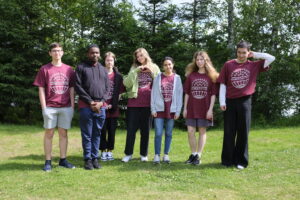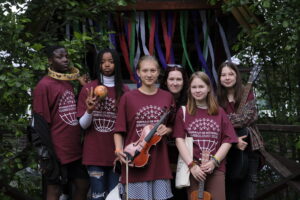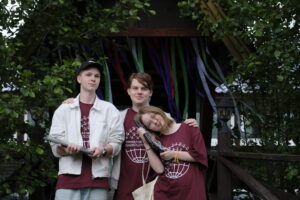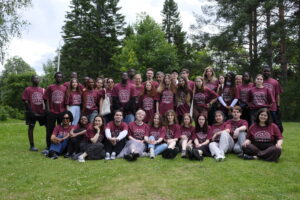 International Summer Camp “Formula of Unity 2025” was held in Garbolovo (Leningradsky region) from June, 25th to July, 6th. Our camp team was glad to welcome participants from Cameroon, Russia and Bulgaria.
International Summer Camp “Formula of Unity 2025” was held in Garbolovo (Leningradsky region) from June, 25th to July, 6th. Our camp team was glad to welcome participants from Cameroon, Russia and Bulgaria.
The theme of the camp was observation of society and its structure.
To implement this idea, the teachers developed a model role-playing game that took up the first half of the camp. During this game, the participants took the position of observers of society, exploring such phenomena as kindness, efficiency and manifestation. The participants explored themselves, how they make decisions, how they interact with each other, what emotions and feelings arise in the process, what results they ultimately achieve. The bright finale of the first part was the event «Good and Evil». In the format of immersive theater, the students were able to immerse themselves in the topic of the camp as much as possible.
The second part of the camp focused on moving from the game to real life. Participants applied the knowledge they gained in the first half to better understand the world around them. The social engineering workshop was particularly productive, as students developed several socially significant projects aimed at improving life in their cities.
The educational component of our camp included five classes: mathematics, music, psychology, programming, and social engineering. Participants remained in one chosen group throughout the camp. Let’s give the floor to the class teachers to learn about the lesson content firsthand.
List of Topics Covered in the Classes:
- Introduction to Logic. What is Logic? Subject of Logic, its objects of study. Definition of a Proposition/Statement. Negation, Conjunction, Disjunction. Statement(propositional) form and truth table. Law of Identity. Law of Non-Contradiction。Law of Excluded Middle. Double Negative Property. De Morgan’s Laws. Tautology and Contradiction.
- Implication, Equivalence. Argument. Logical form of an argument. Rules of Inference. Emphasis on Proof by Contradiction.
- Elementary Set Theory: Union, Intersection, Membership. Briefly on Predicate Logic. Predicates. Universal Quantifier and Existential Quantifier. Negation of Statements with Quantifiers.
- Test on Logic. Introduction to Number Theory. Indication of the working set (number set). Division with Remainder. Uniqueness theorem
- Fundamental Theorem of Arithmetic(without proof). Definition of Congruence Modulo n. Properties of Congruences.
- Properties of Congruences Modulo n (continued). Divisibility Rules. Greatest Common Divisor (GCD). Properties. Definition of Relatively Prime Numbers. Bézout’s Identity, corollary.
How the Classes Were Conducted.
Generally, classes were split into two parts: a lecture and a practical segment. Whenever possible, I assigned students to prove a property on their own and then present it to the others. During the practical session, I gave students exercises that were related to the lecture content. The final session included a test, which was replaced with an oral exam using question cards for two students who requested it.
Social engineering, Alexey Doilnitsyn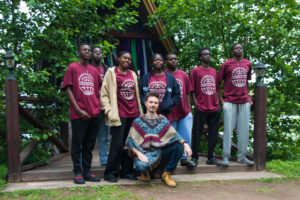
Our classes were focused on learning how to influence the world around us by building communities and establishing grassroots initiatives. Leadership training was based on transact analysis and modern charisma theories. Our students observed the various stages of our group dynamics and did their best to apply theory to the group’s real-world needs. Constant self-reflection on their role within the group allowed students to understand their individual styles of leadership and develop their communication skills.
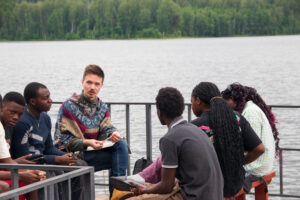 During our classes we observed a wide variety of informal communities with completely different lifestyles, discussing the pros and cons of their approaches. We explored their history, achievements, and the price of their choices. This work included watching documentaries and presentations.We also applied club evolution theories to discuss their development. Learning from these examples, we explored how to establish your own social project or run a successful social club. At the end of the camp students came up with an idea of a group project which they are going to start in the upcoming autumn. The project is dedicated to street safety in Cameroon and focuses on organizing local community night patrols in municipal neighborhoods.
During our classes we observed a wide variety of informal communities with completely different lifestyles, discussing the pros and cons of their approaches. We explored their history, achievements, and the price of their choices. This work included watching documentaries and presentations.We also applied club evolution theories to discuss their development. Learning from these examples, we explored how to establish your own social project or run a successful social club. At the end of the camp students came up with an idea of a group project which they are going to start in the upcoming autumn. The project is dedicated to street safety in Cameroon and focuses on organizing local community night patrols in municipal neighborhoods.
The main goal of the music course within the framework of the summer school was the comprehensive development of the musical abilities of the participants, including both deepening individual skills and mastering the principles of joint creativity.
Thus, the profile work consisted of the following stages:
- Theoretical block.
Classes were held in lecture and discussion formats in order to identify the level of theoretical knowledge of the participants and clarify a unified English-language terminology for use in further training.
- Practical block.
Given the diverse theoretical backgrounds of the participants, the work was focused on consolidating existing knowledge and skills, and applying them in collaborative work formats. The group included participants with experience in choral singing, playing the violin, guitar, and ukulele. They were provided with the necessary instruments, as well as keyboard, wind, and percussion musical instruments. The classes included the following activities:
- A discussion of the distinct features of different countries’ musical cultures.
- Analysis (structure, means of expression) of musical pieces proposed by the teacher and participants.
- Sight-reading of musical pieces (mainly vocal).
- The use of orchestration and arrangement to add instrumental parts, played by participants, to vocal pieces.
- Individual and group improvisation sessions aimed at developing the ability to listen to partners and create a single artistic statement.
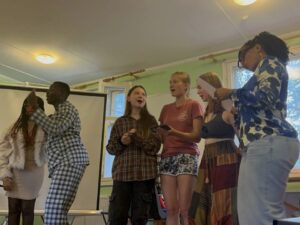 Due to the performance of mainly vocal pieces, most classes were held in the format of choral rehearsals with an emphasis on voice preparation and ensemble tuning, which evoked a significant response and interest from the participants. Skill development was reinforced by performances at camp-wide events.
Due to the performance of mainly vocal pieces, most classes were held in the format of choral rehearsals with an emphasis on voice preparation and ensemble tuning, which evoked a significant response and interest from the participants. Skill development was reinforced by performances at camp-wide events.
- Group project.
The final stage of the course was a collaborative project: recording a piece of music chosen by the participants. During the preparation for the recording, participants applied the skills they had developed throughout the practical block. They also gained valuable experience working with professional audio recording equipment and software. This collaborative project served as tangible evidence of the group’s progress.
Despite some difficulties in discussing theoretical concepts, participants were highly proactive and offered many of their own ideas during the practical part of the course. By the time of the joint project, the group had learned to understand each other and respect their cultural and personal differences. They also successfully involved even the most reserved and inexperienced members in the process.
Psychology, Carolina A. Samarina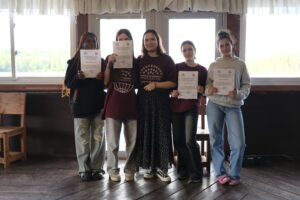
Despite the fact that the lessons were entirely in English, which is not the native language for the participants, they passed the class successfully. Various interactive teaching methods, visual aids and other auxiliary tools were used. When it was difficult for someone to understand a certain topic, others helped by explaining the material in their own words, which in turn was useful in order to retain more information. In order to track the learning of the material, the program was built on the basis of a concentric model, which made it possible to introduce new concepts organically during each lesson and use them more confidently without overloading the children with a lot of unfamiliar information.
The difficulty of teaching psychology at international camps is rooted in the following issues:
- Historically, the Russian school of psychology has had a strikingly different structure compared to its foreign counterparts. This requires the adaptation of key concepts or the creation of new terminology to aid in the understanding of more complex ideas. Comparing the approaches and classifications used by psychologists in different countries was a frequent way to illustrate various points of view.
- Psychology deals with abstract, intangible processes, often requiring complex vocabulary. This limits the topics that can be effectively taught to children learning in a foreign language.
In order to solve these problems, it was decided to use topics that overlap with those already available in «household» psychology. We also decided to select the material based on the participants’ scientific interests. The goal was to apply the knowledge in real-life situations and conduct our own research, while interacting with other study groups of the camp.
In the middle of the camp we organized a class exchange with the leadership class in order to expand the understanding of related sciences and analyze the sociological aspect of the structure of society using psychology, especially the knowledge about human behavior and its causes.
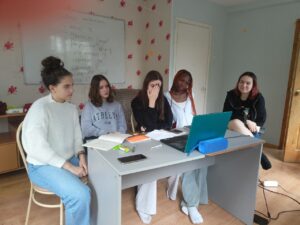 During classes the following themes were discussed: introduction to general psychology (the relationship of psychology with philosophy and other sciences, the history of psychology), the main approaches used in psychology and their founders, structure of the psyche concepts and its defence mechanisms, types of mental processes (within the framework of this topic, the emotional-volitional sphere, character, personality and its accents were discussed the most), psychodiagnostics, comparative characteristics of clinical psychology and psychiatry, art therapy and other areas of psychotherapy.
During classes the following themes were discussed: introduction to general psychology (the relationship of psychology with philosophy and other sciences, the history of psychology), the main approaches used in psychology and their founders, structure of the psyche concepts and its defence mechanisms, types of mental processes (within the framework of this topic, the emotional-volitional sphere, character, personality and its accents were discussed the most), psychodiagnostics, comparative characteristics of clinical psychology and psychiatry, art therapy and other areas of psychotherapy.
The study group had a friendly and trusting atmosphere. As a teacher, I am very proud of my students. I believe that each one of them has done a great and important job not only in the educational process but also in their personal growth. Each of the participants set individual goals for themselves, which, in my opinion, have been achieved. Initially, the students had different English levels, different levels of knowledge about the class topics, and adapted to the camp format at their own pace, but the most important goal of the profile was achieved — to motivate students to continue studying psychology further on their own and to use the acquired knowledge in real life.
The class had two distinct tracks: beginners and advanced.
For the beginner group, we created a contest with math problems and supporting theoretical questions in Python. The work was aimed at studying various approaches to solving problems in programming.
The advanced group worked on a large project: developing a Sudoku solver. While they were debugging, I offered feedback on the code’s speed and efficiency, and the group improved their project By the end of the class, both groups had acquired development skills, the first group received access to the contest for further independent problem solving, while the second group was given an assignment to continue improving their code.
The afternoon at our camp is as important as the classes. It is during group and camp-wide events that participants immerse themselves in the camp theme, learn how to organize and conduct events, reflect, communicate effectively, improve soft skills, and learn more about each other and themselves.
Let’s see what events filled our camp during these twelve unforgettable days!
During the first day of our camp students met the camp staff and discovered the territory of the camp by playing different games.
The second day was dedicated to the planning of the camp: the participants talked about different events which they would like to organize and to participate in; they also had an opportunity to get to know each other better and to get closer through social gatherings and music events
On the third day students took part in the opening of the camp: they chose a name for each of the groups and made a performance which represented the names that they had chosen. Participants also took part in persuasive duels and a dance competition, both of which were quite intense.
On the fourth day of camp, the observers learned to trust each other through team-building activities. Each game required them to be united and supportive. Students became closer to each other, especially after trust-fall.
The fifth day of the camp was very “cozy” because the participants received guests in our team places, telling them about our teams. They also took part in the circle of unity and in the united evening light — these activities allowed students from different teams to spend more time together.
What was special about the sixth day? We should mention the photo-cross made by one of our event councils: the tasks were neither simple nor obvious, so it took the children time to complete them; and in the evening our observers participated in the game “Good and Evil”, where they listened to chilling stories and had to make difficult decisions.
The seventh day of the camp was different from the others because the participants visited Saint-Petersburg. While one group visited the Hermitage Museum, the other discovered the beauty of the city center on a stroll.
The eighth day of the camp was dedicated to feelings. Students watched the movie “Inside Out”, then they split up into teams led by different emotions (Joy, Sadness, Fear, Disgust and Anger) and made short films representing each of these emotions.
On the ninth day of the camp the participants organized a great talent show, revealing just how creative our students are: they listened to songs and poems, watched dances and even sang the famous song “Happy Birthday” in seven languages.
The tenth day of the camp included TED Talk organized by students and a big disco event from the event council. Our camp members finally had an opportunity to relax and dance a lot.
The last day of our camp was intense and emotional: the participants analyzed all the events that they had had; they participated in the closing ceremony and said goodbye to each other during evening lights. The participants also had an opportunity to talk to each other for the last time during our final activity — the farewell.
Parting is one of the saddest moments of our lives. That’s why the camp team is looking forward to next summer and is already preparing Сamp 2026. See you next time!
Анонс
Международная выездная школа
Летом 2025 года Фонд Эйлера снова проводит выездную школу «Формула Единства». К участию приглашаются школьники 14–20 лет со всего мира!…
Блог
26 июня 2025
✨ On the 26th of July a group of young observers started their journey towards the Formula of Unity! ✨
Our first day was quite intense, full of …
27 июня 2025
This day begun with classes that set a thoughtful tone — psychology touched on coping mechanisms through a creative social experiment, music …
28 июня 2025
✨Obstacle course, brainstorming, tasty food and new knowledge — the third day of our camp was so intense ✨
Let’s talk about events we had today!
…
29 июня 2025
This day at our camp was full of fun and friendship. After classes participants planned activities in the Event Council.
Also teams prepared and …
